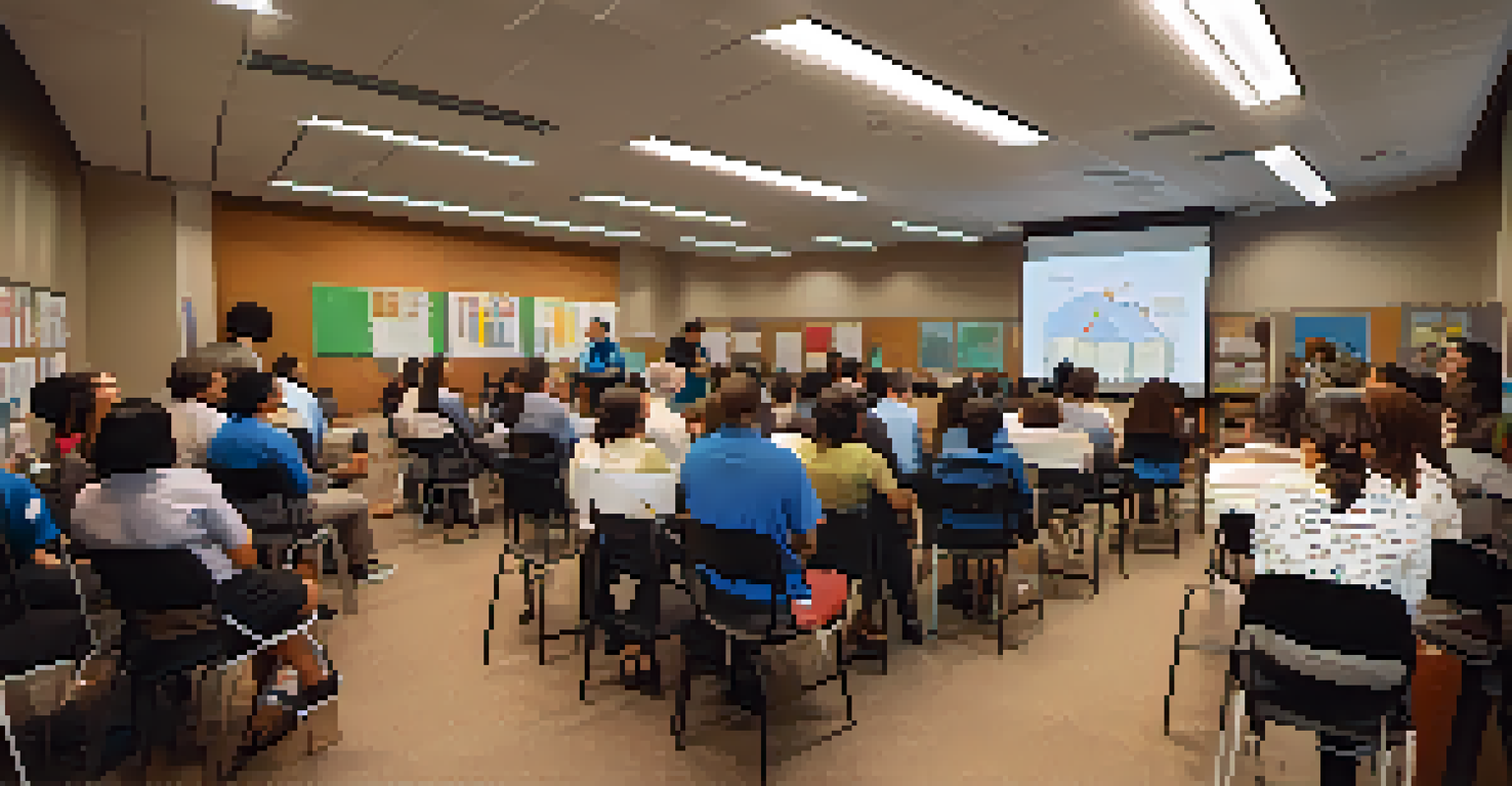How to Foster Cultural Awareness in School Communities

Understanding Cultural Awareness and Its Importance
Cultural awareness is the recognition and understanding of the diverse backgrounds and traditions within a community. In schools, fostering this awareness is crucial as it promotes inclusivity and respect among students. When children learn about different cultures, they develop empathy and a broader perspective on the world around them.
Cultural awareness is the foundation of effective communication and collaboration in an increasingly globalized world.
Not only does cultural awareness enhance social cohesion, but it also prepares students for a globalized society. As they engage with diverse peers, they cultivate skills that are essential for collaboration in future workplaces. This understanding can diminish prejudice and stereotypes, creating a more harmonious school environment.
Moreover, culturally aware students are more likely to appreciate their own identity while respecting others'. This mutual respect leads to enriched learning experiences, where students feel valued and empowered to share their unique perspectives. Thus, embedding cultural awareness in school culture is a foundational step toward a more inclusive educational journey.
Incorporating Diverse Curriculum and Resources
One effective way to foster cultural awareness is by integrating diverse curricula that reflect multiple perspectives. This can include literature from various cultures, historical accounts that highlight different experiences, and inclusive art projects. When students see themselves represented in their studies, it enhances their engagement and personal connection to the material.

Additionally, using resources like documentaries, guest speakers, and cultural artifacts can enrich students' understanding. For instance, hosting an author from a different culture to discuss their work can provide invaluable insights that traditional textbooks may lack. These experiences not only inform students but also inspire them to think critically about cultural narratives.
Cultural Awareness Fosters Inclusivity
Understanding diverse backgrounds promotes respect and empathy among students.
Schools should also encourage students to explore their own heritage and share it with classmates. This peer-to-peer learning fosters an environment of curiosity and appreciation, where students learn from one another’s experiences. By embracing a diverse curriculum, schools create a vibrant learning atmosphere that celebrates cultural richness.
Creating Inclusive School Events and Celebrations
School events and celebrations provide excellent opportunities to promote cultural awareness. Organizing multicultural days, where students can showcase their traditions through food, dance, or art, encourages community participation and pride. These events allow students to share their heritage in a fun and engaging way, breaking down barriers and fostering connections.
Diversity is not about how we differ. Diversity is about embracing one another's uniqueness.
Moreover, celebrating various cultural holidays teaches students the significance behind these traditions. For example, recognizing Diwali or Lunar New Year in school activities helps all students appreciate the diversity of their peers. Such celebrations can be accompanied by educational components, like classroom discussions or workshops, to deepen understanding.
By creating inclusive events, schools not only celebrate diversity but also cultivate an environment where all students feel valued. This sense of belonging is crucial for their emotional and social development. Ultimately, these events can transform the school culture into a more welcoming and accepting space for everyone.
Encouraging Open Discussions About Culture
Open discussions about culture create a safe space for students to express their thoughts and experiences. Schools can facilitate these conversations through dedicated class time or special forums, where students are encouraged to share their cultural backgrounds and perspectives. Such dialogue can lead to richer understanding and respect among classmates.
Teachers play a vital role in guiding these discussions, ensuring that they remain respectful and constructive. They can introduce topics related to cultural identity, stereotypes, and social justice issues, prompting students to think critically about their own beliefs. This approach not only promotes awareness but also develops students' critical thinking skills.
Engaging Families Enhances Learning
Involving families and the community strengthens cultural ties and enriches student experiences.
Furthermore, establishing a culture of dialogue helps students learn to navigate differences. They become more equipped to address misunderstandings and conflicts that may arise from cultural differences. By fostering an environment of open communication, schools prepare students to engage with a diverse world beyond the classroom.
Training Staff on Cultural Competency
Training staff on cultural competency is essential for creating an inclusive school environment. Professional development workshops focused on understanding cultural diversity help educators recognize their biases and learn effective teaching strategies. When teachers are culturally competent, they can better connect with their students and support their diverse needs.
Moreover, culturally aware educators can serve as role models for students. They demonstrate the importance of respecting and appreciating differences, which students are likely to emulate in their interactions. This positive influence can ripple through the school community, fostering a culture of understanding and acceptance.
Regularly revisiting cultural competency training ensures that staff remain informed about evolving cultural dynamics. This ongoing education is crucial in adapting teaching methods and school policies to reflect the diverse needs of the student body. Investing in staff training ultimately enhances the overall educational experience for all students.
Engaging Families and the Wider Community
Fostering cultural awareness isn't limited to the classroom; engaging families and the wider community is also vital. Schools can create partnerships with local cultural organizations, inviting families to participate in school activities and share their traditions. These connections strengthen the school-community bond and enrich students' cultural understanding.
Moreover, hosting workshops or information sessions for families can equip them with tools to discuss culture at home. Encouraging parents to share their cultural practices and values helps bridge the gap between school and home, reinforcing the importance of cultural awareness. This collaborative approach creates a supportive atmosphere for students to explore their identities.
Continuous Evaluation is Key
Regularly assessing cultural initiatives ensures they meet the needs of a diverse student body.
Involving the community in school initiatives also demonstrates the value of diversity to students. When families see their cultures represented in school activities, it fosters pride and encourages active participation. Ultimately, this engagement creates a holistic cultural awareness that extends beyond the school walls.
Evaluating and Adapting Cultural Awareness Initiatives
To ensure the effectiveness of cultural awareness initiatives, schools must evaluate their programs regularly. Gathering feedback from students, parents, and staff can provide valuable insights into what is working and what needs improvement. This process allows schools to adapt their strategies to better meet the needs of their diverse student body.
Additionally, setting measurable goals can help track progress in fostering cultural awareness. Schools can assess student engagement in cultural activities, participation rates in discussions, or feedback on inclusivity in the curriculum. These metrics help highlight areas of success and those that require further attention.

By being open to change and continuously improving their approaches, schools can create a dynamic environment that truly values cultural diversity. This commitment to evaluation not only enhances educational experiences but also ensures that all students feel respected and included in the learning community.